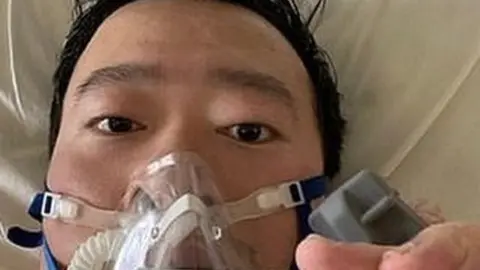Li Wenliang: Widow of Chinese coronavirus doctor gives birth to son
 Dr Li Wenliang
Dr Li WenliangThe widow of Li Wenliang, a Chinese doctor who raised the alarm about the country's coronavirus outbreak, has given birth to their son.
Fu Xuejie shared a picture of the boy on the messaging app WeChat, calling him a "final gift" from Dr Li.
Dr Li was arrested by authorities for "spreading rumours", and later died after catching the virus.
After a public outcry over his death, he was exonerated and honoured as a hero by the government.
His widow, Mrs Fu, now has two sons with her late husband. In her message she wrote: "Husband, can you see this from heaven? You have given me your final gift today. I will of course love and protect them."
Mrs Fu told local news outlet Litchi News that after her husband's death she suffered from health problems brought on by grief and had to be temporarily hospitalised to keep the unborn baby safe.
She described Dr Li as a responsible doctor and loving husband, and said her family initially hid his death from their other child, saying that "Dad went abroad."
Her baby photo has been commented on by thousands of users on the Chinese social network Weibo, many offering well-wishes. Others left comments asking the media to not bother the family.
Who was Li Wenliang?
Dr Li was an eye doctor at a hospital in Wuhan, the city at the epicentre of China's coronavirus outbreak. In December he sent a message to fellow doctors saying that he had noticed seven cases of a virus he thought looked like Sars - a disease that spread globally in 2003. He warned them in a group chat to wear protective gear to avoid infection.
Days later, he was told by police to "stop making false comments" and was investigated along with eight other doctors for "spreading rumours." Soon after Dr Li contracted coronavirus from a patient and shared his experiences on social media before he died in February.
His death prompted a wave of public anger over the government's handling of the outbreak, with accusations that it downplayed the severity of the virus and initially tried to keep it secret. A BBC search of social media at the time showed thousands of critical remarks on Weibo were censored.
After an investigation, Chinese authorities apologised to Dr Li's family and admitted to "shortcomings and deficiencies" in their response.
Along with 13 other frontline workers, Dr Li was commended as a "martyr" in April for sacrificing his life to fight coronavirus. As a result, under Chinese law it is now an arrestable offence to criticise him.

A 'martyr' in China's epidemic fight?
Analysis by Kerry Allen, BBC China analyst
The government wants people in China to remember Dr Li Wenliang as a "martyr" in China's epidemic fight - the highest honour anybody can be granted posthumously.
Anyone who makes negative comments about a "martyr" can actually be held criminally accountable under China's "Heroes and Martyrs Protection Law".
But the Chinese public have not forgotten how the local authorities in Wuhan initially tried to punish Dr Li himself from sharing his concerns in December about the virus.
When he died in February, there was widespread anger across China. Furious comments poured in from social media users on Sina Weibo and WeChat criticising the state, on such a scale that government censors struggled to take them all offline.
Many still perceive that his muzzling could have prevented thousands of lives, including his own, from being lost, and feel personally affected by his death. "More should have been done at the time," wrote one user on the Weibo social media network today.
Other users asked that the state found a way to make amends by ensuring the safety and protection of his widow and his children. "It is all of our responsibility to educate future generations on Wenliang," wrote one.
